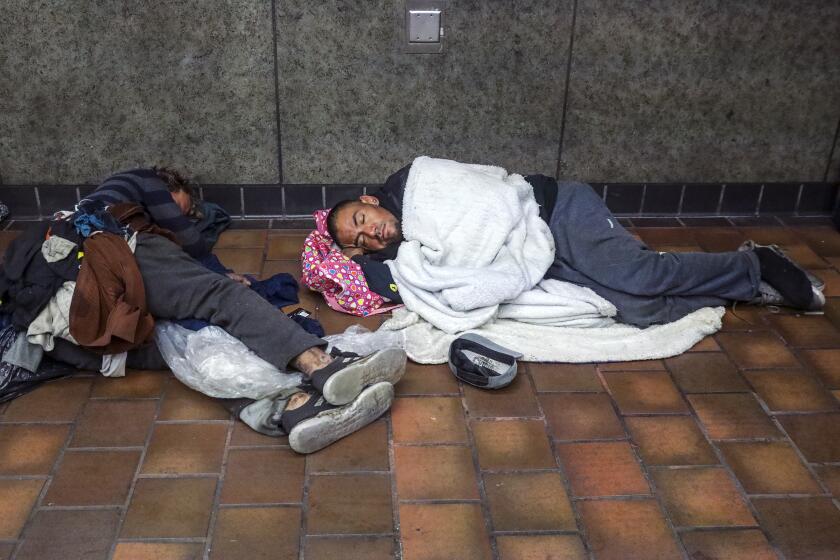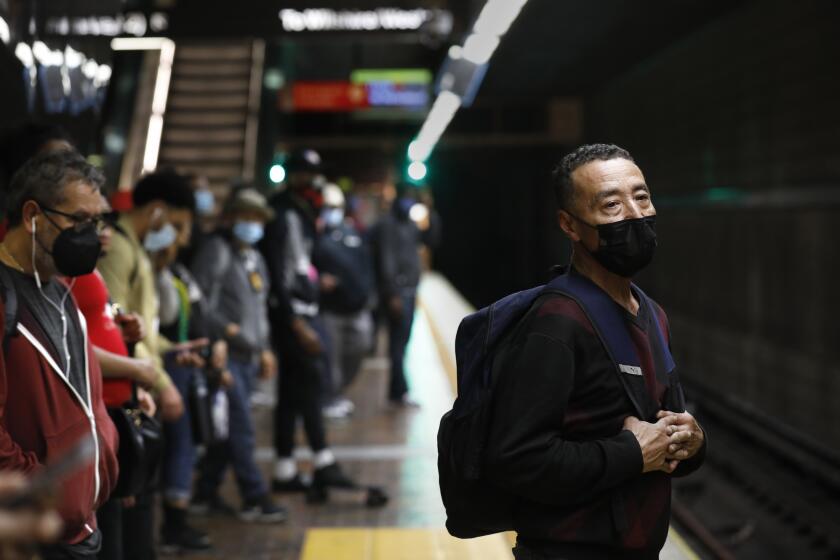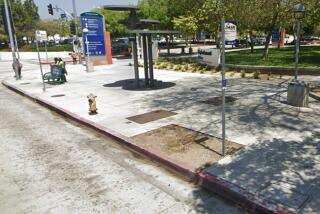Violent crime and verbal abuse at Union Station have become unbearable, some workers say
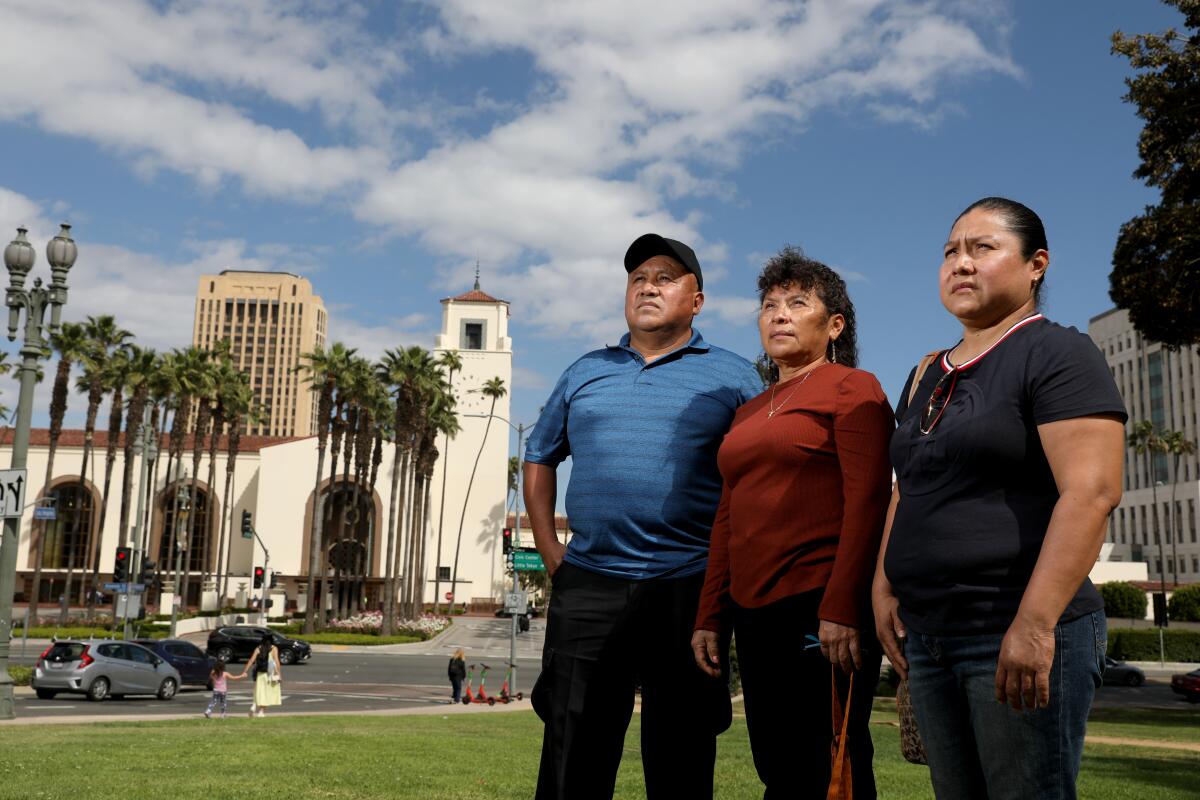
- Share via
Janitor Gerardo Mixcoatl heard the cry as he was preparing to sweep and refill the toilet paper in a men’s room stall at Union Station.
“Gerardo, Gerardo, help me!” screamed Maria. The two often worked in pairs for safety, and she had just entered the women’s bathroom when she felt a blow on the back of her neck. As she turned, a homeless woman pushed her to the floor and hit her repeatedly with a mallet, according to court records.
Mixcoatl dashed into the bathroom and yelled “Stop!” The woman struck him and ran off.
The attack last April, just days after Hollywood celebrated the Academy Awards at the historic station, was one of 235 assault and battery cases the Los Angeles County Metropolitan Transportation Authority has documented between the start of the pandemic in March 2020 and February. In the first two months of this year, violent crime at the station has shot up 94% over the same period last year, and property crime has doubled.
But Mixcoatl and half a dozen others who work at Union Station say the danger is even worse than the official statistics reflect. Open nearly 24 hours a day, the Art Deco rail station has become a haven for homeless people, some of whom exhibit erratic or violent behavior that workers say keeps them constantly on guard for their safety.
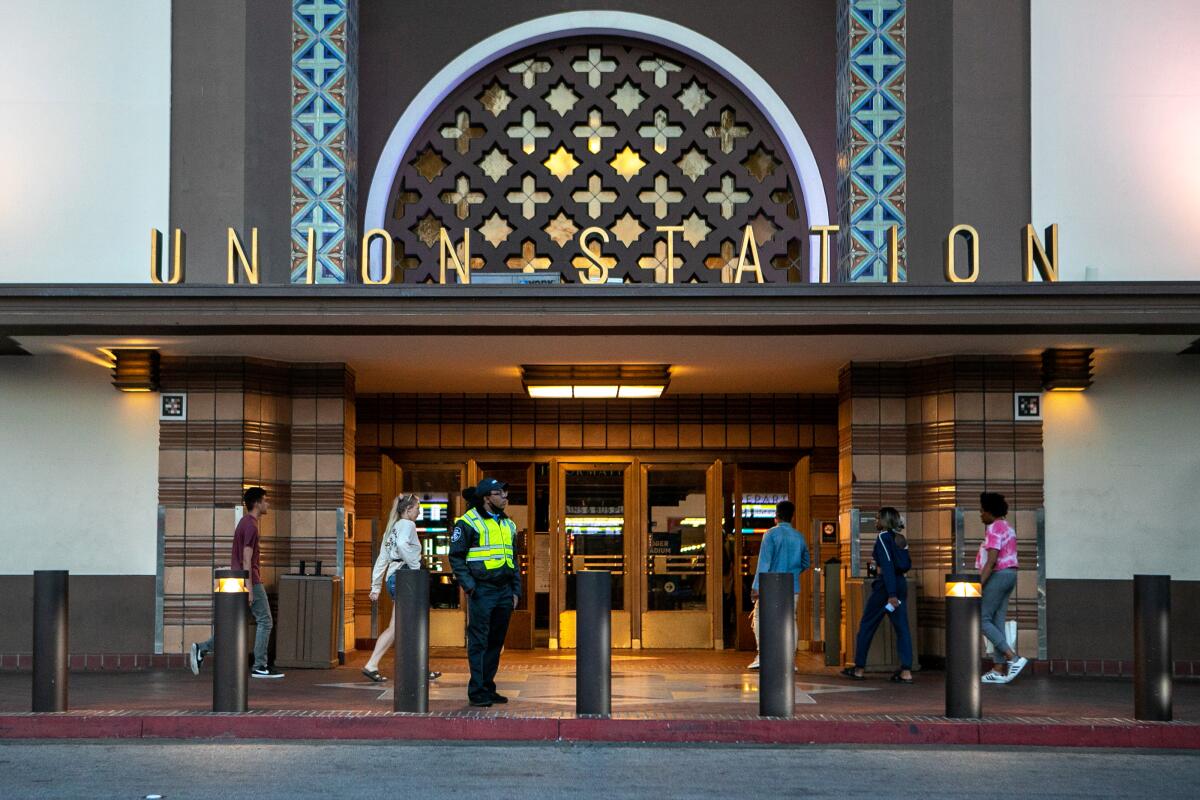
“We are scared. We are frustrated. Every day something happens,” Mixcoatl said. “We don’t know if we are going to return home to see our children.”
The low-wage workers of the transit hub say that some homeless people use the bathrooms to take showers, do drugs or have sex, that they urinate and defecate in the corridors, taunt servers, hurl items, and openly steal. A shoeshiner said they have thrown things at him at least three times in the past six months.
Nineteen of the 21 janitors working at Union Station report being threatened or assaulted while doing their job, said Alejandra Valles, chief of staff of the SEIU United Service Workers West. The union is preparing a labor grievance and has enlisted Cornell University to help examine conditions at the transit hub.
Some workers say the situation has become unbearable.
“A lot of people that have been here have quit or are planning to quit because of being exposed to the constant verbal abuse,” said Rene Herrera, one of the managers at the deli Trimana.
Not long ago, a man off the street threw a rock into the store, smashing the glass walls.
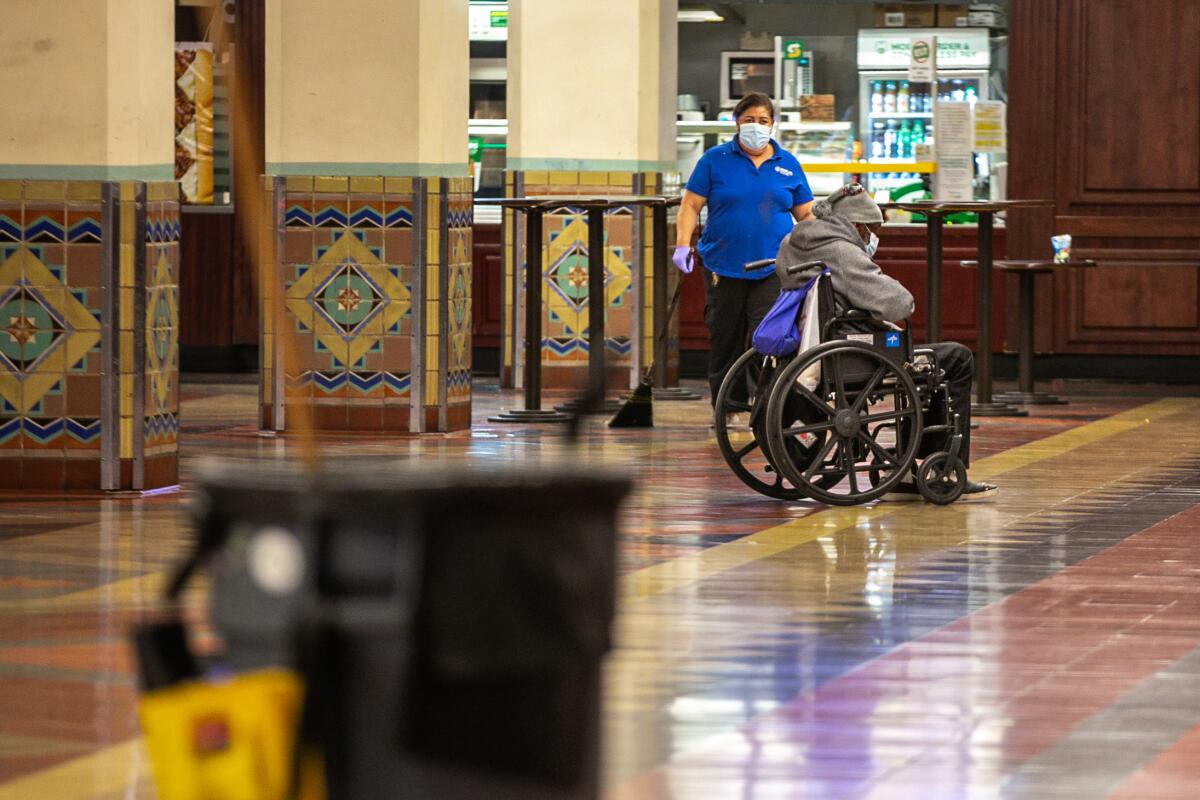
“Imagine if that rock would have gotten inside. The window broke at the same side where customers are in line,” he said. “Imagine if there would have been a lady there, a little kid in the way of that rock. It would have been a lot worse.”
Earlier this year, a mentally ill person attacked Sandra Shells, 70, an emergency-room nurse and avid transit user, near a bus stop across the street from Union Station. She was slapped and pushed in an unprovoked attack, and fell and hit her head, according to authorities. She died of her injuries.
Unlike other parts of Metro’s sprawling rail and bus system, there is no law enforcement contracted to patrol the 38-acre Union Station at all hours of the day.
Though Metro owns the station, the property is overseen by a joint management council consisting of Amtrak, Metro and Metrolink, which has relied on an informal security agreement with the Los Angeles Police Department that is more geared to terrorist attacks or other major incidents.
The LAPD’s Transit Services Bureau did not regularly respond to routine crime calls until May, when crime was spiking and it began doing daytime foot patrols outside of its contract. Those patrols now extend from 6 a.m. to 7 p.m., with two or four officers on site at a time.
“We’re going to be the best partners that we can be,” said Donald Graham, deputy chief of the Transit Services Bureau. “But at the end of the day, we are a contracted service, we perform the duties that the contract asks us to perform.”
Thousands of homeless people find refuge from the streets riding trains and buses, hindering Metro’s efforts to boost commuter ridership.
Most of the night, only private security guards are on site. Up to a few weeks ago, they worked three shifts throughout the day, and were unarmed and trained only to “observe and report” potential crimes. Metro officials say they have since added guards with Mace, batons and handcuffs intended to “de-escalate” situations.
But those efforts have not allayed workers’ fears.
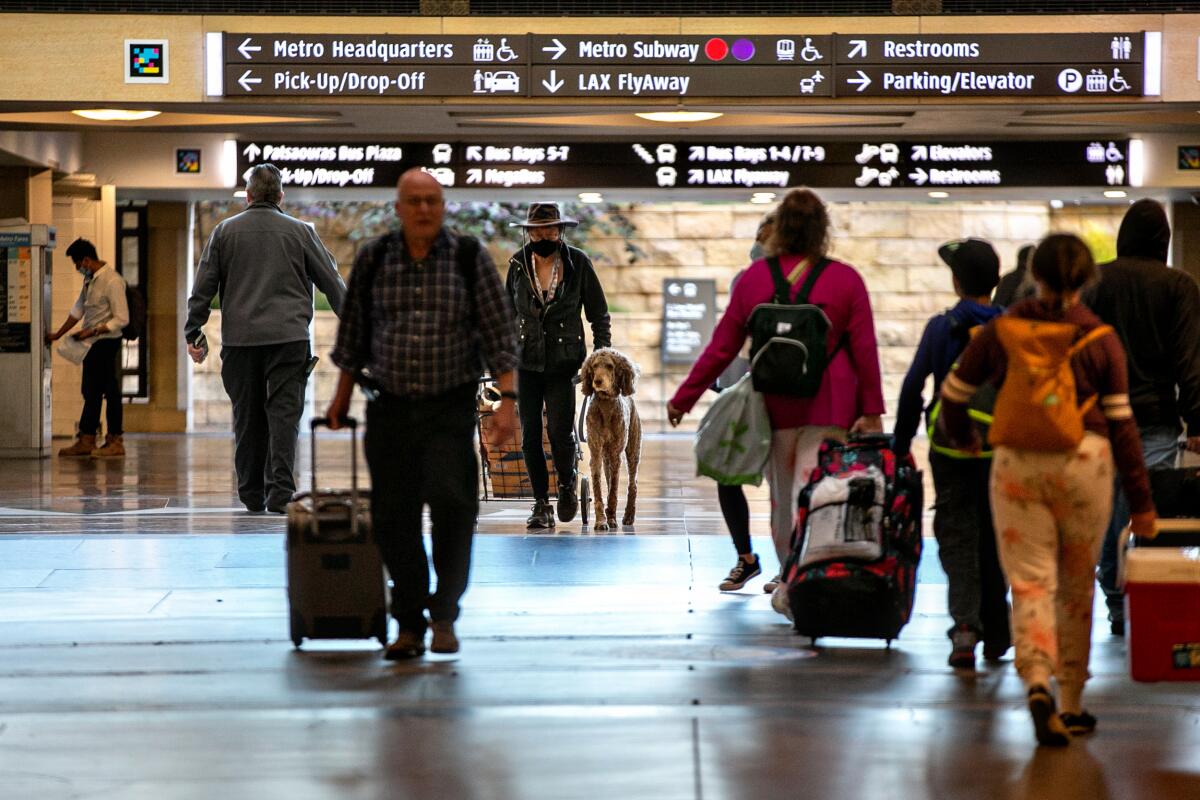
Albertha Mendez, a janitor, feigned that she was ignoring a homeless man who was threatening to rape and kill her as she tried to keep track of him over the sound of the wax machine she was motoring over the tile floors. Suddenly, the man grabbed her hair from behind.
He smashed her head on the top of the machine and fled as security arrived. Guards eventually detained him. She still has the video on her phone of him cursing at her as he sat on the floor surrounded by the guards. A few days later, she saw him walking around the station again.
“The security does nothing. They only watch,” she said. “We don’t have protection. There is no support for us.”
She’s afraid to fight back, because she doesn’t want to get fired for hurting anyone. Mendez has worked for the janitorial company for 18 years and rents a two-bedroom house with her son in Whittier. “I am a single mother, this is my only work. My family depends on me,” she said. “If something happens to me, my family will be without. I feel impotent, because I can’t do anything.”
Despite the somber conditions, Metro still has high hopes for Union Station, the largest transit hub west of the Mississippi, which drew 100,000 travelers daily before the pandemic. The agency purchased the national landmark, built in 1939, for $75 million in 2011 and has put more than $27 million into renovations, including adding air conditioning and restoring the wide leather seats in the waiting area. The station serves Amtrak, Metrolink and Metro’s buses, subway and light rail lines, and would be a stop for the California High Speed Rail line.
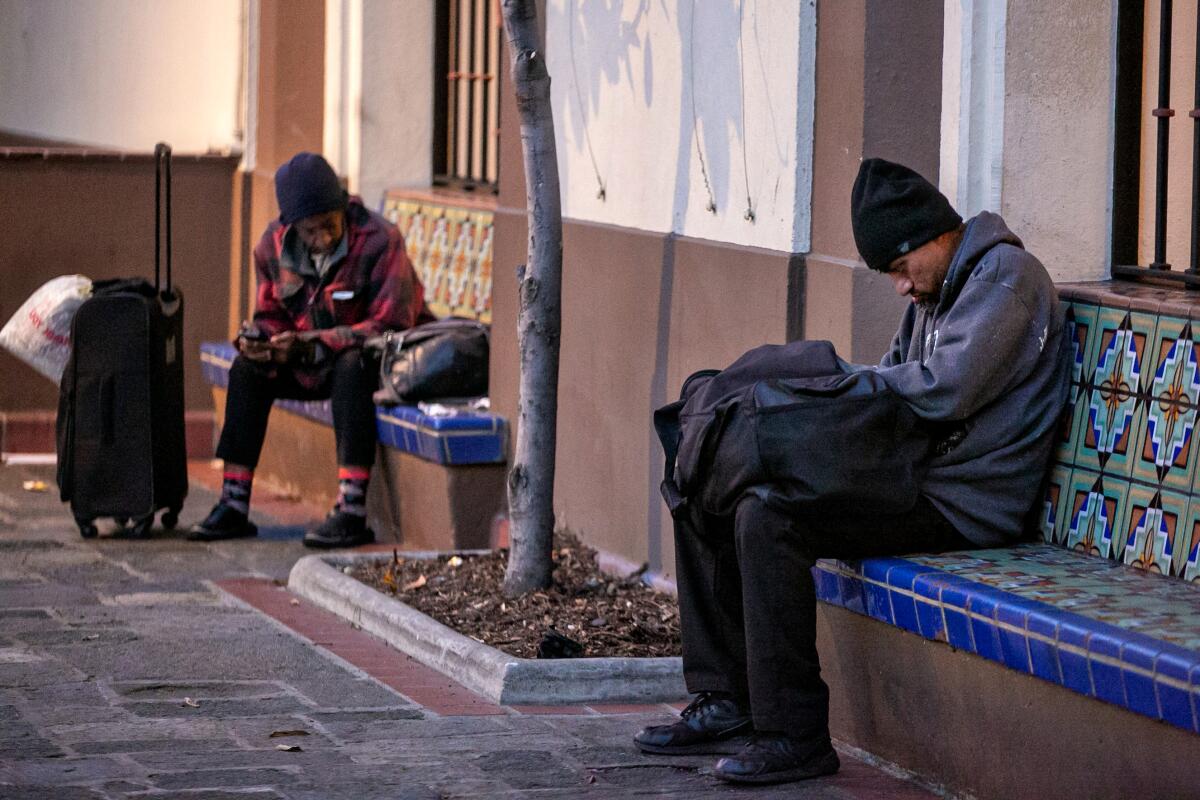
Holly Rockwell, a senior executive officer at Metro, acknowledged security “gaps” but said the property’s problems are reflective of higher crime across the city.
“Everywhere around the county, crime is increasing, and Union Station has not been exempt from that,” Rockwell said.
Morlin Asset Management, the contractor overseeing day-to-day operations at the facility, declined to comment.
In Los Angeles this year, through the middle of March, violent crime was up 7% and property crimes rose 10% compared with the previous period. Throughout the Metro system, violent crimes have similarly jumped 7%, and property crimes rose 26%, for the first two months of this year, the most recent statistics available. The issue isn’t unique to Los Angeles; transit agencies across the country are grappling with higher crime rates and more homeless people on the systems, even as they are trying to bring riders back.
Metro is considering more aggressive measures, including contracting with the LAPD to lock in patrols and services. But the situation raises larger questions about how Metro will police its facilities in the post-pandemic transition.
Ridership cratered as much as 70% during the height of the pandemic. The system became a refuge for unhoused people who often lack access to addiction or mental health services. The agency has poured millions of dollars into getting homeless individuals into shelter, but many loiter at terminals like Union Station. It is one of the few public places with bathrooms that are open all night downtown. It sits about a mile from skid row, across from encampments on overpasses above the 101 Freeway.
Metro’s contract with law enforcement agencies across its system runs through the end of the year.
Alfonso Directo Jr., advocacy manager at the Alliance for Community Transit-Los Angeles, a social justice coalition, has been pushing to reduce the number of law enforcement officers. He and other advocates are calling for the agency to spend less money on police services and more on social service workers for homeless people and amenities such as bathrooms that serve the largely low-income riders.
“We need to do a lot to separate the issues of homelessness and safety,” Directo said. “As people encounter mental health issues, we should also be addressing it with mental health service provision, with ... therapists [and] social workers to support people rather than punish people.”
Gasoline prices have reached record highs in Los Angeles, but convincing tens of thousands of Angelenos to leave their gas guzzlers at home is still a hard sell for many.
Social justice activists say police in communities around transit stations can respond to calls as they would to any other property and don’t need a special contract. They say enforcement on the system disproportionately affects Black riders, something reflected by Metro’s own statistics: Black riders received 53% of fare-evasion tickets in 2020 even though they were only 16% of the riders. Adding more officers and ticketing passengers for smoking, drugs or evading fares, Directo said, could just exacerbate an already racially lopsided enforcement approach.
Graham, the LAPD deputy chief and its former homeless coordinator, said he would like to see the department work more closely with social services to have real-time diversion.
“If somebody is accused of shoplifting, and it’s shoplifting food because they’re hungry, we should be able to transport that person not to jail, but to someplace with a service provider that can provide them with a meal,” he said.
On a recent Friday, Trimana was filled with customers. A group of tourists headed toward the information booth, and a boy wearing a face mask was chasing after his mother. A homeless woman stared blankly in front of the store, not moving. The station was bustling, with no sign of trouble.
But Chris Nordstrom, part owner of Traxx, said the workers are constantly faced with confrontations. Last week, a man swung a broken bottle at him, he said.
“I got the head of security to come down. And all he said was, ‘Well, I guess you could call the cops but they’re just gonna process them and then an hour later, he’s gonna come back,’” Nordstrom recounted. “I said, ‘Well, can’t you just make sure he doesn’t come into the station?’ And he said, ‘Well, you know, there are a lot of people that look like this guy. So we don’t know who he is. So they’ll probably come back.’ ”
He did, the next day — “fortunately, not with a bottle,” Nordstrom said.
Marco Ramirez, who shines shoes at Union Station, said he’s been attacked twice by a man who threw coffee at him, once after he stepped in because the man was harassing a deaf woman.
The litany of small and large threats infuriates Alejandra Valles, chief of staff for the United Service Workers West, which represents the janitors who work at Union Station.
“I want everyone to stop being politically correct. Talk to the workers, ask them what they think, and that’s the way you serve our community,” she said. “What we believe is that somebody should have the right to go to work and walk out alive.”
More to Read
Sign up for Essential California
The most important California stories and recommendations in your inbox every morning.
You may occasionally receive promotional content from the Los Angeles Times.

